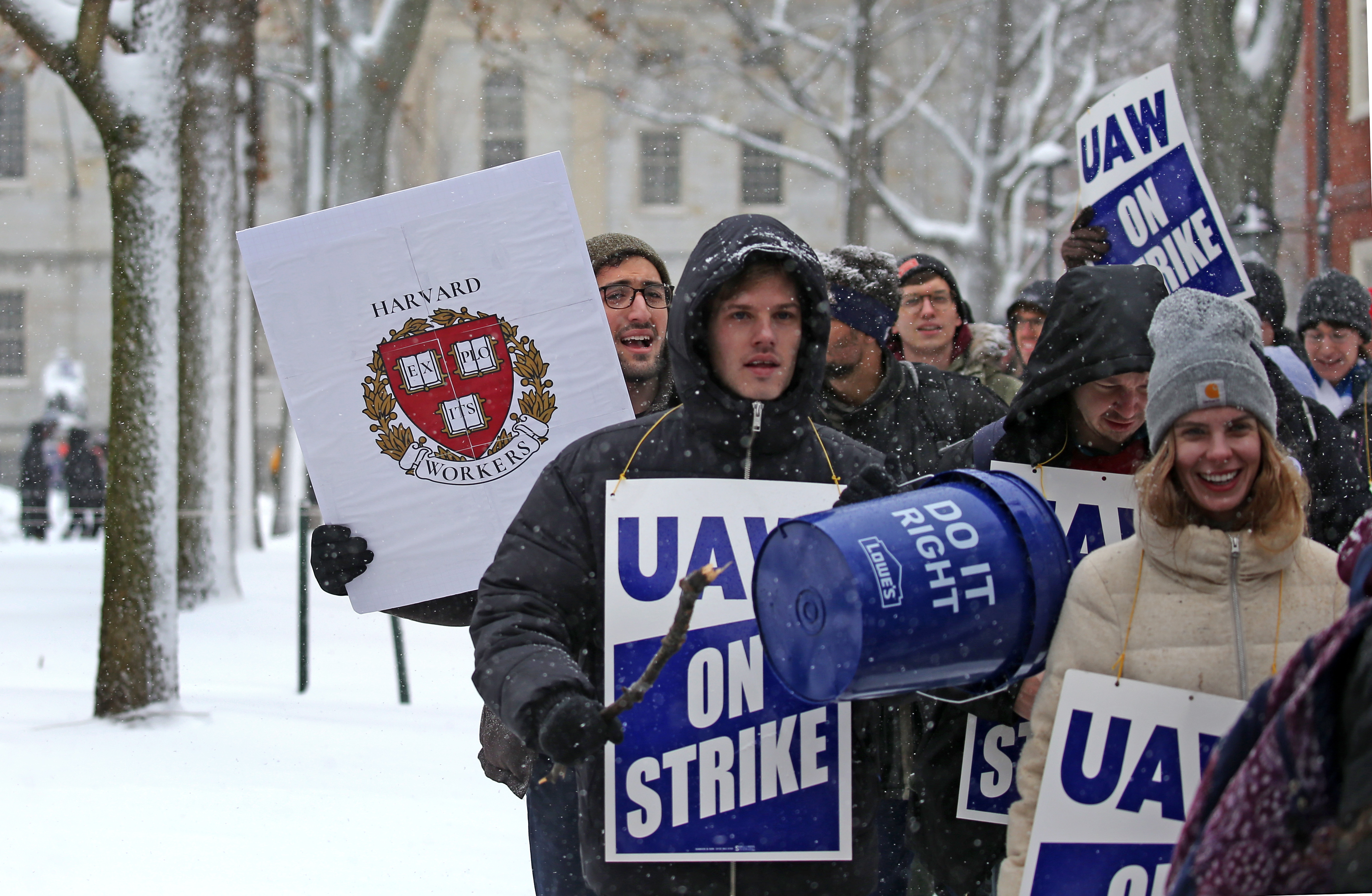When Students Are Striking at Harvard, You Know Class Rage Is Peaking

Credit to Author: Alex Norcia| Date: Wed, 04 Dec 2019 14:40:38 +0000
On Tuesday morning, Harvard graduate students did what they've promised they might do for the past month: go on strike. It was a windy, snow-covered winter day in Cambridge—which is to say, it was a winter day in Cambridge—as hundreds of rising academics from across disciplines flooded Harvard Yard, in the sight of two of the most prominent administration buildings at the most prominent college in America and perhaps the world.
This didn't come out of nowhere.
Since 2018, the university and the Harvard Graduate Student Union (HGSU), as it's known, have met for a total of 28 bargaining sessions, according to a university spokesperson. (The HGSU is affiliated with the United Auto Workers union, or UAW.) Though they have agreed on up to 12 contract provisions, key ones remain, including the exact percentage of increase to compensation (the HGSU has asked for a 15 percent bump over the course of three years), specifics on labor arbitration in regards to harrassment and discrimination, and benefits in general.
Harvard is currently in its "reading period"—the week or so given to students to prepare for exams and write their final papers—and Justin Bloesch, a fourth-year PhD student in economics and a member of the bargaining committee, said that while the strike wasn't necessarily planned this way, the timing had obvious benefits.
"This is a high-impact time for us, when we're supposed to be grading," he said. "One major problem we still have is equability. There are a lot of gaps. It's much easier to be a graduate student, say, if you're young and healthy and single."
Are you a student at a college or university where workers are on or considering going on strike? Using a non-work device, you can contact Alex Norcia securely via Signal at 201-429-7024 or email at alex.norcia@protonmail.com.
The belabored contract negotiations arrive at a moment when higher education has clearly become a flashpoint for class-conscious millennials and Gen Zers, especially those in the tech and digital media sectors with increasingly notorious anti-union bosses. Democratic candidates like Elizabeth Warren and Bernie Sanders have both called for some form of tuition-free college and cancellation of existing student debt, and the fact that Harvard has one of the largest endowments in human history arguably made it a ripe target for academic class warriors. (Warren had previously endorsed the union, and on Monday, Sanders sent out a tweet in support of the union and the pending strike.)
Recent events have built toward a willingness by student workers to confront college administrators. Take last December, when undergraduate student employees at the self-proclaimed progressive Grinnell College in Iowa were embroiled in a fight with their own administration about trying to form a union. Or this past spring, when a nationwide bribery scandal in which parents paid for their children's test scores to be inflated and for accolades to be awarded to them for sports they never even played dominated the news and landed at least one B-list actress in prison. Or this past September, when California Governor Gavin Newsom signed a bill that would allow athletes in the National Collegiate Athletic Association (NCCA) to hire agents and promote their likeness in endorsement deals—a decision that threatened the very model of profit extraction from college sports.
In response to a request for comment, the university directed VICE to a press statement published on Tuesday: "Harvard University remains engaged in negotiations with HGSU-UAW and we continue to feel a strike is unwarranted," it reads in part. "Student workers have a vital role in fulfilling Harvard's teaching and research mission, and with that in mind, the University is committed to addressing concerns that have been raised throughout this process."
As of early Tuesday evening, Harvard had not budged, and there had been no additional comment from the university.
"I think they're just used to holding onto the power they've always had," Bloesch said.
Sign up for our newsletter to get the best of VICE delivered to your inbox daily.
Follow Alex Norcia on Twitter.
This article originally appeared on VICE US.